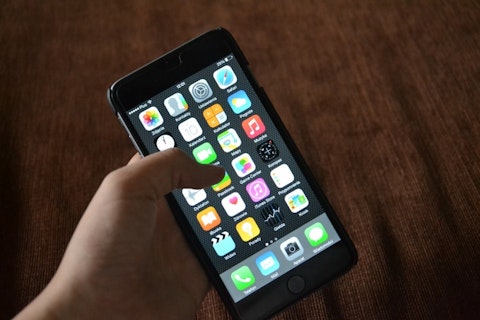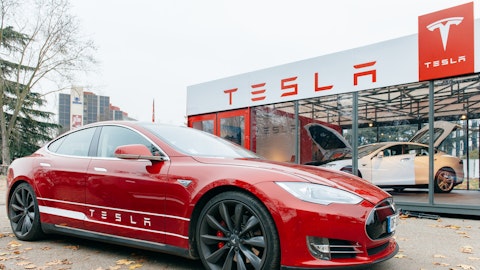Disappointing demand for the Apple Watch and weaker than expected iPhone shipments shaved off more than $110 billion from Apple Inc. (NASDAQ:AAPL) market value. The recent skid has been largely brushed off as an outgrowth of AAPL’s periodic volatility, which has been well documented since the 1990s. While AAPL’s recent volatility doesn’t foretell its future performance, sales projections for its upcoming iPhone 6s and 6s Plus raise warning signs for even the most hardline supporter. Insider Monkey, known for its research (read more details here) showing that hedge funds’ small-cap picks outperform large-caps, has been bearish on Apple over the last year due to its iPhone-focused business model. Ian Dogan, the site’s co-founder, recently warned of Apple’s future success still being tied to one product. Dogan also warns that consumers may be unwilling to pay the high premiums for the iPhone if another recession were to hit. He believes that consumers would switch to lower-priced phones that are increasingly becoming comparable in quality to the iPhone.

In a slightly bearish sign, the funds that Insider Monkey tracks cut their exposure to AAPL with 142 funds now holding about $21.3 billion in stock compared to 150 holding about $21.5 billion in stock according to their previous filings. Still, legendary investor Carl Icahn, coming off his big gains in Netflix, Inc. (NASDAQ:NFLX), maintained his previous position in AAPL of about 52.8 million shares. Icahn was followed by Fisher Asset Management with 11 million shares and Adage Capital with 8.85 million shares. It’s hard to argue with Icahn, who has been one of the most successful investors of all-time, but the recent news on the iPhone may signal that this Icahn investment may not turn out as great as the others like NFLX.
Zero-to-Negative Growth Outlook for iPhone 6s
For the first time ever, iPhone sales are expected to stagnate or decline over year-ago levels. Generally speaking, any sign that iPhone growth is reaching its peak – so-called “Peak Apple” – is a major cause of concern for Wall Street.
Sales of Apple Inc. (NASDAQ:AAPL)’s next iPhones – the 6s and 6s Plus – are forecast to hit around 70 million in the December quarter, down from 74.5 million a year ago. Given that iPhone sales account for roughly two-thirds of quarterly revenues, a YoY drop in sales would be clear indication AAPL has reached critical mass. The annals of Wall Street are filled with companies that lost an average of 76% of their value after previously impressive growth streaks stalled or stopped altogether. On average, these companies saw their revenues stagnate for at least the next 15 years.
AAPL Revenues by Product, FY 15 Q3 (April – June)
Apple generated 63% of its revenue from the iPhone in the latest quarter followed by the Mac at 12%. Services came in 3rd at 10%, while the iPad represented 9% of revenue and Other Products took 5%. Services include iTunes, AppleCare, and Apple Pay. Other Products include Apple TV, Apple Watch, Beats Electronics, iPod and Apple-branded third-party accessories.
iPhone sales have been the major catalyst behind AAPL’s massive valuation. It’s no coincidence that revenues and market cap began to skyrocket in 2007 – the year the first-generation iPhone was revealed. Absent another silver bullet, which the company clearly lacks despite a slew of impressive products, AAPL’s valuation is due for another decline.
Services, Other Products Simply Aren’t a Factor
It would be easy to tout Apple Inc. (NASDAQ:AAPL)’s “services” and “other products” (see chart) as catalysts for future growth, but any serious investor knows that AAPL stock is synonymous with the iPhone. And while there’s a lot to love about Apple Pay and Apple TV, these products and services simply won’t give the iPhone maker the legs it needs to reach that trillion dollar valuation that looked like a given almost one year ago.
Apple Watch? Aside from being lumped in with “other products” in the quarterly report, the wearable gadget didn’t live up to its buzz. According to Google Trends, the Apple Watch is the least searched AAPL product. Yes, even less than the decade-old iPod.
Combined – iTunes, AppleCare, Apple Pay, Apple TV, Apple Watch, Beats Electronics, iPod and Apple-branded third-party accessories accounted for just 15% of Q3 revenues. That means AAPL is in no position to diversify its revenues away from the iPhone. In fact, the complete opposite is true. The iPhone has actually seen its share of total revenues rise over the years. That means the iPhone’s influence on AAPL’s valuation has actually increased, not decreased. Simply recall that iPhone sales accounted for around 40% of AAPL revenues in FY 2011, compared with nearly 70% in 2015 Q1 and 63% in the most recent quarter. When you’ve reached the pinnacle on the back of one product and one product only, the only way left is down.
AAPL Should Tighten its Grip on Mobile
AAPL has clearly carved out its niche in the mobile smartphone market, which gives it a huge advantage in the emerging mobile payment business. According to some estimates, US mobile payments volume will sky-rocket at a CAGR of 172% over the next 5 years, reaching $818 billion by 2019 or 15% of total US payment volume. AAPL recently added the Discover card to its mobile payments service, which already includes VISA (V), MasterCard (MA), and American Express (AXP). According to company CEO Tim Cook, Apple Pay will be accepted at 1.5 million US locations by the end of the year.
With Google Inc (NASDAQ:GOOG) ramping up its mobile payment efforts, now would be the ideal time to for AAPL to set its sights on major acquisitions that can extend its leadership pace in this growing market. Instead of re-engineering the mobile payments market and starting from the ground up, AAPL should consider acquiring a company like Square, the San Francisco-based merchant services provider that draws influence from Steve Jobs’ design philosophy. Square already has a $6 billion valuation after just five years in operation and has been praised by Business Insider for its elegant, easy to use product.
Revel Systems is another mobile payment provider that would make a solid pickup by AAPL. Revel, which develops iPad point-of-sales solutions, recently received a valuation of $500 million from Roth Capital Partners. Revel’s POS systems are already deployed in thousands of US locations and can make a great catalyst for iPad sales, which declined 23% in AAPL’s latest quarter.
Takeaway
AAPL needs to make a big acquisition to bring life back to its stock and to secure the eminence of the iPhone if it remains majorly levered to that product – whether it likes it or not. Beats just didn’t cut it. People certainly won’t stop shopping and paying for things – so an acquisition of Square, Revel, or another company that beefs up the capabilities and functions of the iPhone and adds value to its other products will put investors’ worries at ease that AAPL is a one-product company. AAPL has prided itself on self-innovation, but it needs to make a big splash soon to not only breathe life back into its lagging stock but also solidify the iPhone’s dominant position for the next few years. If it comes up with another product that comes to rival the iPhone in sales or catch fire with consumers – well – that would be great – but investing on that premise is based on hope. In the meantime, investors need to be reassured that the iPhone’s success will not wane in the ever-changing technology industry. So wouldn’t it be ironic if AAPL was seen as thinking outside the box – by buying “Square?”
Disclosure: The author has no position in AAPL or other securities mentioned in the article.





